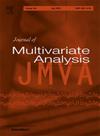Robust signal recovery in Hadamard spaces
IF 1.4
3区 数学
Q2 STATISTICS & PROBABILITY
引用次数: 0
Abstract
We analyze the stability of (strong) laws of large numbers in Hadamard spaces with respect to distributional perturbations. For the inductive means of a sequence of independent but not necessarily identically distributed random variables, we provide a concentration inequality in quadratic mean and a strong law of large numbers, generalizing a classical result of K.-T. Sturm. For the Fréchet mean, we generalize H. Ziezold’s law of large numbers in Hadamard spaces. In this case, we neither require our data to be independent nor identically distributed; reasonably mild conditions on the first two moments of our sample are enough. Additionally, we look at data contamination via a model inspired by Huber’s -contamination model, in which we replace a random portion of the data with noise. In the most general setup, we neither require the data nor the noise to be i.i.d., nor do we require the noise to be independent of the data. A resampling scheme is introduced to analyze the stability of the (non-symmetric) inductive mean with respect to data loss, data permutation, and noise, and sufficient conditions for its convergence are provided. These results suggest that means in Hadamard spaces are as robust as those in Euclidean spaces. This is underlined by a small simulation study in which we compare the robustness of means on the manifold of positive definite matrices with means on open books.
Hadamard空间的鲁棒信号恢复
我们分析了Hadamard空间中关于分布摄动的大数(强)定律的稳定性。对于独立但不一定同分布的随机变量序列的归纳平均数,我们提供了二次均值的集中不等式和强大数定律,推广了k - t的经典结果。Sturm。对于fr均值,我们在Hadamard空间中推广了H. Ziezold大数定律。在这种情况下,我们既不要求我们的数据是独立的,也不要求数据是同分布的;在我们的样品的前两个时刻有相当温和的条件就足够了。此外,我们通过一个受Huber的污染模型启发的模型来研究数据污染,在这个模型中,我们用噪声替换数据的随机部分。在最一般的设置中,我们既不要求数据也不要求噪声是id的,也不要求噪声独立于数据。引入了一种重采样方案,分析了(非对称)归纳均值在数据丢失、数据置换和噪声方面的稳定性,并给出了其收敛的充分条件。这些结果表明,Hadamard空间中的均值与欧几里德空间中的均值具有同样的鲁棒性。一个小型的模拟研究强调了这一点,在这个研究中,我们比较了正定矩阵流形上的均值与开放书本上的均值的鲁棒性。
本文章由计算机程序翻译,如有差异,请以英文原文为准。
求助全文
约1分钟内获得全文
求助全文
来源期刊

Journal of Multivariate Analysis
数学-统计学与概率论
CiteScore
2.40
自引率
25.00%
发文量
108
审稿时长
74 days
期刊介绍:
Founded in 1971, the Journal of Multivariate Analysis (JMVA) is the central venue for the publication of new, relevant methodology and particularly innovative applications pertaining to the analysis and interpretation of multidimensional data.
The journal welcomes contributions to all aspects of multivariate data analysis and modeling, including cluster analysis, discriminant analysis, factor analysis, and multidimensional continuous or discrete distribution theory. Topics of current interest include, but are not limited to, inferential aspects of
Copula modeling
Functional data analysis
Graphical modeling
High-dimensional data analysis
Image analysis
Multivariate extreme-value theory
Sparse modeling
Spatial statistics.
 求助内容:
求助内容: 应助结果提醒方式:
应助结果提醒方式:


